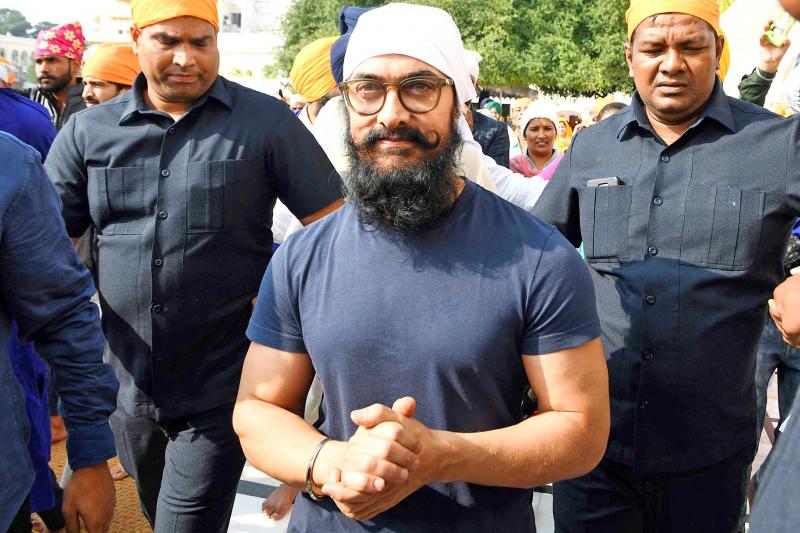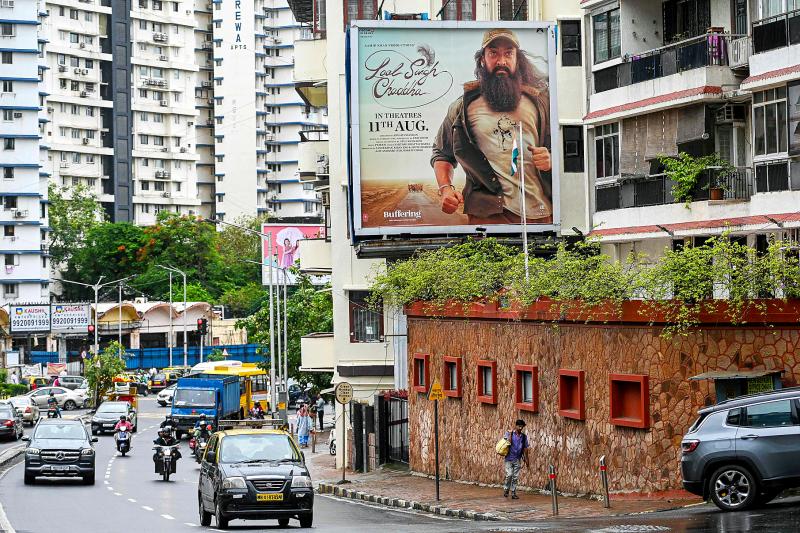One of India’s biggest stars is banking on a remake of Hollywood feelgood hit Forrest Gump to revive the fortunes of Hindi-language Bollywood, after a string of weak box-office showings.
Aamir Khan’s Laal Singh Chaddha, an adaptation of the 1994 US classic starring Tom Hanks, hits cinemas today ahead of India’s 75th independence celebrations.
Disappointing takings for other Bollywood A-listers have cast a pall over an industry still recovering from COVID-19 lockdown losses when many in movie-mad India turned to streaming giants like Netflix and Disney+ Hotstar.

Photo: AFP
The adaptation keeps several iconic scenes from the original — which netted six Oscars, including for Best Picture — such as a floating white feather, ping-pong playing and lots of running.
But there are several changes, with Gump’s “box of chocolates” line becoming “Life is just like a golgappa. Your tummy might feel full, but your heart always craves more.”
Golgappa is a popular Indian snack, while the second half of the saying — “you never know what you’re gonna get” in the original — draws from a common Hindi phrase.

Photo: AFP
The film promises to take people through India’s history in the same way Gump stumbled through and influenced major US events like the Vietnam War.
This could irk Indian right-wing critics who have already called for a boycott of the film because of comments made by Khan in 2015 that were deemed to be unpatriotic.
Khan, the star of megahit Dangal (2016), and screenwriter Atul Kulkarni were coy in sharing what Indian historical settings would be featured.

Photo: AFP
Kulkarni would only say that his script was a “beautiful story about a beautiful country called India through a beautiful person called Laal Singh.”
Khan, 57, admitted that he initially put off reading Kulkarni’s script, uncertain it would be possible to adapt such a “cult classic.”
“It’s like saying we are remaking Mughal-e-Azam and Mother India. It’s not a wise thing to do,” he said, referring to two Indian classics. “But when I heard the script, I understood he’s done it. It was a moving experience for me. I really loved it. The moment I heard it I wanted to do this.”
Bollywood star Kareena Kapoor, 41, who plays Singh’s lifelong friend Rupa, based on Robin Wright’s Jenny Curran, said the plot was “timeless” with a love story at its core.
“I wondered how they would play around with such an iconic film,” added Naga Chaitanya, a Telugu-language star from the southern film industry “Tollywood” who plays Bala, an adaptation of Gump’s shrimp-fishing Vietnam comrade Bubba. “But the way they have conceived the film for Indian cinema is unique.”
Recent silver-screen hits have not come from Hindi-language Bollywood but are in other Indian languages, such as action flicks Pushpa, KGF: Chapter 2 and RRR.
RRR, released in March, raked in US$87 million domestically, while KGF: Chapter 2, which debuted a few weeks later, took in US$106 million, media analyst Karan Taurani of Mumbai-based Elara Capital said.
Action film Shamshera, released on July 22 and starring Bollywood actor Ranbir Kapoor, has so far only made US$5.6 million, dashing hopes it would lure audiences back to Hindi cinema.
A rare Bollywood hit this year has been comedy horror Bhool Bhulaiyaa 2 released on May 20 and featuring rising star Kartik Aryan, which has brought in US$24 million so far.
Now, all eyes are on Laal Singh Chaddha and family dramedy Raksha Bandhan” with Bollywood megastar Akshay Kumar — which also releases today.
Taurani estimates that Laal Singh Chaddha will make US$19 million, falling short of Khan’s per-film average of US$35 million.
Khan, who co-produced Laal Singh Chaddha, believes Bollywood hasn’t lost its mojo, blaming the early release of movies on streaming services for lower box-office takings.
“I feel that perhaps we — I’m including myself in this — as Hindi filmmakers, need to... also pick topics which are relevant to a larger audience, as opposed to picking topics which are relevant to a smaller audience,” he said.

One of the most important gripes that Taiwanese have about the Democratic Progressive Party (DPP) is that it has failed to deliver concretely on higher wages, housing prices and other bread-and-butter issues. The parallel complaint is that the DPP cares only about glamor issues, such as removing markers of Chinese Nationalist Party (KMT) colonialism by renaming them, or what the KMT codes as “de-Sinification.” Once again, as a critical election looms, the DPP is presenting evidence for that charge. The KMT was quick to jump on the recent proposal of the Ministry of the Interior (MOI) to rename roads that symbolize

On the evening of June 1, Control Yuan Secretary-General Lee Chun-yi (李俊俋) apologized and resigned in disgrace. His crime was instructing his driver to use a Control Yuan vehicle to transport his dog to a pet grooming salon. The Control Yuan is the government branch that investigates, audits and impeaches government officials for, among other things, misuse of government funds, so his misuse of a government vehicle was highly inappropriate. If this story were told to anyone living in the golden era of swaggering gangsters, flashy nouveau riche businessmen, and corrupt “black gold” politics of the 1980s and 1990s, they would have laughed.

It was just before 6am on a sunny November morning and I could hardly contain my excitement as I arrived at the wharf where I would catch the boat to one of Penghu’s most difficult-to-access islands, a trip that had been on my list for nearly a decade. Little did I know, my dream would soon be crushed. Unsure about which boat was heading to Huayu (花嶼), I found someone who appeared to be a local and asked if this was the right place to wait. “Oh, the boat to Huayu’s been canceled today,” she told me. I couldn’t believe my ears. Surely,

When Lisa, 20, laces into her ultra-high heels for her shift at a strip club in Ukraine’s Kharkiv, she knows that aside from dancing, she will have to comfort traumatized soldiers. Since Russia’s 2022 invasion, exhausted troops are the main clientele of the Flash Dancers club in the center of the northeastern city, just 20 kilometers from Russian forces. For some customers, it provides an “escape” from the war, said Valerya Zavatska — a 25-year-old law graduate who runs the club with her mother, an ex-dancer. But many are not there just for the show. They “want to talk about what hurts,” she